- Home
- Kristin Harmel
The Room on Rue Amélie Page 2
The Room on Rue Amélie Read online
Page 2
But was that true? Most of the time, Charlotte didn’t think much about religion at all. Lately, however, some of the other children had been calling her names, even saying that she had a big nose, which was ridiculous, because her nose was the exact same size as Thérèse Petit’s, and everyone knew Thérèse Petit was the most beautiful girl in school, and a Catholic at that. Still, Jean-Marc Thibodaux in particular always seemed to have an insult ready for her. He called her “Dirty Yid” or told her to go back to where she came from. His friends had laughed when she’d looked at him blankly the first time and said she’d been born right here in Paris, just like him. “But your parents weren’t,” he’d sneered. “My papa says you don’t belong here.”
So that was it; the words were coming from her schoolmates’ parents. It made Charlotte feel a bit better and a bit worse at the same time. Better because this wasn’t really about her. Worse because it wasn’t fair that she had to be the face of a religion she barely practiced. It wasn’t as if she went around thinking about the Torah all the time.
“Ignore them,” Micheline whispered when it was clear Charlotte was on the verge of tears. “They’re just pigs. You know that. Groin groin.” Her friend’s oinking always made Charlotte laugh, and she knew Micheline was right. Still, it didn’t remove the sting.
“Why do we have to be Jewish anyhow?” she asked her parents over dinner on the first night of Hanukkah. She knew her question would upset them, but it would be so much easier to be Christian. Why couldn’t they see that?
“Hush, Charlotte,” Papa said. “Don’t speak of things you don’t understand.”
Charlotte felt the familiar burn that she experienced every time her father treated her like a child. “How can I understand if you never talk to me?”
Her father stared at her and then seemed to soften. “You should be playing with dolls, not worrying about politics and religion.”
“I haven’t played with a doll in years. I’m almost eleven.”
“Reuven,” Maman said sharply. “Talk to her.”
Papa sighed, took off his glasses, and pinched the bridge of his nose. It was his look of defeat, Charlotte knew, the one he sometimes wore after arguments with Maman. “Charlotte, being Jewish is something to be proud of, not something to be ashamed of.”
“Then why do my classmates mock me?”
Charlotte could see him flinch, but he answered calmly. “Because they are ignorant. And cruelty is the weapon of the ignorant.”
“But what if I don’t want to be Jewish?” Charlotte persisted.
Her parents exchanged glances filled with sadness. “My dear,” Papa said at last, “your mother is Jewish, and so according to our faith, you are Jewish too. It’s a beautiful part of you. It will forever be.”
Charlotte opened her mouth to protest, but she was out of words. She didn’t want to change who she was, not really. It was just that she hated to be different. If only she could have blond ringlets and parents who invited the local priest over for supper, like Thérèse Petit.
After she helped wash the dishes and lit the first candle on the menorah with Maman and Papa, Charlotte stepped out onto the small terrace of their apartment, which offered a sliver of a view of the top of the Eiffel Tower. It was her favorite place in the world, for when she drew the curtains closed behind her, she found some privacy. Besides, she liked to imagine that the tip of the tower was actually the highest turret of a castle and that she was a princess who would one day return to her rightful place on the throne. Not that she would ever breathe a word of that daydream; she realized how childish it would make her sound.
“Good evening.”
Charlotte jumped, startled by the voice that came from the next terrace over. She was always alone out here, so it hadn’t occurred to her to look around. She blinked into the darkness until she saw a young woman with pin-curled auburn hair and crimson lips standing against the railing outside the apartment next door.
“Hello?” Charlotte answered tentatively. She’d seen the woman before; she was beautiful and very fashionable. She was perhaps twenty or twenty-five, and she was always wearing pretty, tailored dresses that showed off her narrow waist and high-heeled shoes that Charlotte would undoubtedly trip in. She had an accent, but when Charlotte had asked her parents about it, her father had said that it didn’t matter where the woman was from, because she was French now, just like them.
“It’s a lovely night,” the woman said. She wasn’t looking at Charlotte; she was gazing at the Eiffel Tower. “It’s a bit cold, of course. But there’s something bracing about the fresh air, isn’t there? It snaps you out of a feeling of malaise.”
How had the woman known that Charlotte was out here feeling sorry for herself?
After a moment, the woman spoke again. “I’m Ruby. I live next door to you. But then, you can probably see that.”
“I’m Charlotte,” Charlotte replied, feeling suddenly grown-up. “It’s a pleasure to meet you.”
“It’s a pleasure to meet you, as well.” There was a pause, and then the woman asked gently in her strange accent, “Is there something you’d like to talk about?”
“Pardon?”
“It’s just that I couldn’t help noticing that you seem upset. Unless you’re sniffling because you’ve caught a cold. In which case, excuse me for intruding.”
Charlotte was grateful that the darkness would hide her embarrassment. “No. I’m fine. Thank you.”
“Well, then, perhaps you can help me with something.”
“But I’m only ten,” Charlotte blurted out. “Well, almost eleven.” An adult had never asked for her help before.
Ruby laughed. “That’s all right. What I need most of all is advice. You see, I’m American.”
“American?” Charlotte was momentarily dazzled. She’d never met an American before; the immigrants she knew were from eastern Europe. “But America is so far away.”
“Indeed it is. I fell in love with a Frenchman and followed him across the ocean to live here. He has lived in this building for a long time. Perhaps you know him?”
“Yes, of course, Monsieur Benoit. Well, my maman and papa know him.”
“I see. Well, Charlotte, this is my problem, and it makes me rather sad: sometimes, people treat me differently because I’m American. They judge me before they know me.”
It was almost exactly what Charlotte had been trying to explain to Papa! To think that the glamorous woman next door had the same sort of problem! “I suppose that’s rather silly of them,” she said slowly.
“How so?”
“Well,” Charlotte said, struggling to put her thoughts into words. “The fact that you are American doesn’t change who you are on the inside. It is just one piece of you.”
“Hmm. That’s quite a good point. But what do you think I should do about the way I’m feeling?”
Charlotte thought about this. “You can’t always change other people’s minds. But you can change whether or not you listen to them, can’t you?”
“Why, yes,” Ruby said. “You know, Charlotte, I think I was right. You are very wise indeed. I will think about what you said.”
“Okay,” Charlotte said, suddenly shy again. She wanted to ask Ruby many more questions. What was America like? Where had she learned to speak French so well? What did she think of Paris? Was she worried about the war that everyone said was coming to France? But Ruby was already moving toward the door of her terrace, and Charlotte realized with a great swell of disappointment that she had missed her chance.
“Thank you, Charlotte,” Ruby said. “I hope we talk again soon.” And then she was gone, leaving Charlotte alone to overlook the moonlit courtyard.
Only later did Charlotte realize that her kitchen window was open a crack, and that if Ruby had already been on her terrace, she would have heard Charlotte’s whole conversation with her parents. The thought made Charlotte feel a bit silly at first, but by the time she went to sleep that night, she felt a little less alone.
CHAPTER FOUR
January 1940
It was icy cold and rainy when Thomas Clarke arrived at the Little Rissington airfield in the Cotswolds for the first time. Not a very good welcome, he thought. The conditions at Desford, where he’d learned to fly DH 82 Tiger Moths, hadn’t been much better, but Little Rissi was supposed to be the real deal, the place where he would earn his RAF wings, where he would learn to fly fighters. He had imagined, somehow, wide-open, verdant fields and babbling blue streams. Instead, the world here seemed to be a study in all the shades of brown and gray, with the wind turning the raindrops into vicious projectiles. By the time he and Harry Cormack made it inside the brick building at the front of the complex, their brand-new RAF blues were drenched straight through.
“If Marcie could see me now,” Harry muttered, glancing down at his sopping uniform as they waited for the station commander. “You’re lucky you don’t have a sweetheart, Thomas. There’s no one to see you in this state.”
“Yes, lucky me.” Thomas rolled his eyes at the man who’d become his closest friend at Desford, where they’d survived the harrowing first weeks of make-or-break flight training together. He refrained from mentioning that Harry likely wouldn’t be seeing his love anytime soon anyhow. The world was at war, and there was a rush to get the newest recruits into the skies. Besides, Harry seemed to have a new girl every few weeks. Where did he find the time? And how could he worry about wooing the young ladies who hung around the pub they frequented when there was battle to be waged? Surely that sort of thinking was a distraction they couldn’t afford.
“Attention!” a warrant officer bellowed to the soaked RAF hopefuls. Thomas and Harry sprang to ramrod straightness and turned their eyes toward the door.
A beak-nosed man with close-cropped white hair strode in, fixing them all with a steely gaze. “Welcome to RAF Little Rissington,” he barked after the warrant officer had introduced him as the station commander. “You may have thought that your early training days were easy, but things are about to change. This is where we separate the men from the boys. It’s up to you to decide which you’ll be. Your studies here will be tough, your training relentless. Remember: the planes cost a bloody fortune. You, on the other hand, are easily replaceable. Act accordingly.” He strode off without another word.
“Cheerful chap,” Harry muttered.
“He was just trying to scare us,” Thomas replied. But it had worked. As he and Harry trudged through the downpour toward the mess hall a few minutes later, Thomas’s heart was in his throat, and he wondered, not for the first time, whether he actually belonged here.
Thomas was assigned to bunk with Oliver Smith, who’d also come from Desford, and Harry was four doors down. The next morning, they all made their way to stores to collect their assigned flying kits, parachutes, and huge piles of textbooks.
“Are we meant to read all of these?” Harry asked, feigning distress under the weight of the books.
“The planes cost a bloody fortune, chaps,” Thomas deadpanned. “You are replaceable.”
Harry and Oliver laughed, and soon, they were all choosing lockers in the crew room of Number 2 Hangar. As Thomas extracted his new helmet, his leather gloves, his Sidcot suit, and his pristine flying boots, he felt a surge of pride and trepidation. He was ready to be a man, for there was no room for anything else. He had to do all he could to protect England.
“WHY DID YOU JOIN UP, sir?”
The question came from Jonathan Wilkes, Thomas’s flight sergeant, as they took off from the airfield at Kidlington, just east of Little Rissi, in a Harvard training aircraft. The low-wing monoplane was nothing like the Tiger Moths that Thomas had learned to fly at Desford, and he was still a bit overwhelmed by the sheer number of controls on the squat beast.
“It felt like the right thing to do, Flight,” Thomas replied, guiding the trainer up through a sharp gust of wind. The stick shuddered, but Thomas kept his grip steady. “Helping the cause, and such.”
“How so?” Wilkes persisted. His tone wasn’t combative, merely curious. “You could have joined the army and been on the ground already.”
“But I can do more here.”
“Even if it’s dangerous?”
“Danger is a part of war, isn’t it?”
“Indeed,” Wilkes replied, and Thomas had the feeling he’d passed some sort of test. “Well, then, I’m going to show you now, sir, what it feels like to stall in this aircraft. You’re going to bring us out of it.”
“Yes, all right.” He’d gotten accustomed to stalls in Tiger Moths, after all. How different could this be? “Ready when you are.”
The words were barely out of his mouth when the Harvard choked and whipped nearly to a dead stop in midair. An instant later, they were plummeting nose-first toward the ground.
“Dear God!” Thomas shouted, but the words were lost in the sudden shrieking of the plane’s descent, the air outside biting at the wings.
“Easy on the stick, sir.” Wilkes sounded calm, but his tone didn’t do much to slow Thomas’s racing pulse. The aircraft shuddered and whined, and though Thomas knew the cabin was sealed, he felt as if there were sharp gusts pulling at his flight suit. The air screamed as the barracks on the ground below came into focus. Thomas pulled back sharply, following his instinct to raise the nose of the plane, but it shook and stalled again and continued its plunge toward the earth.
“You increased the wing load too severely.” Wilkes’s tone was only slightly panicked. “Slow and steady, bring us out of it. Do it now.”
Thomas took a deep breath and eased back on the stick, finally guiding the nose upward until they were once again parallel to the ground. “Christ, Flight! Are you trying to kill me before the Germans get around to it?”
The hint of a smile crossed Wilkes’s lips. “Now we’re going to climb back up and do it again, because you’re going to need to be able to do that in an instant. The skies are unforgiving, and your sharp reactions will mean the difference between life and death.” He paused and waited for Thomas to catch his breath. “The fate of England is in your hands, sir. You must proceed as if it is your destiny to save us all.”
CHAPTER FIVE
June 1940
The exodus had begun in earnest by the time June arrived.
Paris was in bloom, the chestnut trees lush and fragrant. Flowers in blue, pale green, and deep red spilled from window boxes and inched across the public gardens, painting the silent streets. But to Ruby, it felt as if nature itself was taunting the city. Soon, the world she knew would be swallowed by the coming Nazi invasion.
Ruby could feel their approach like a storm on the horizon, the air pregnant with something sinister. Though the French had collectively closed their eyes to the truth for months, ignoring German aggressions near the border, the jig was up. The Germans had simply gone around the Maginot Line, steamrolling their way through the forests and into France. They would be here any day now with their stiff marching, their too-polished uniforms, their strange Nazi emblem, a colorless pinwheel warped by the wind.
French generals were already declaring the Battle of France finished as bedraggled troops retreated hastily south. Air raid sirens pierced the nights. Cars moved in stealthy darkness, their headlights painted dark blue. Shops closed, apartments were shuttered, and Parisians fled in droves, clogging the roads as German bombs splintered the countryside. Paris was deserted, and without the laughter of the neighborhood children, a curtain of quiet had descended. Even the Eiffel Tower, a dagger against the crisp sky, seemed preternaturally still, as if it, too, was holding its breath.
“For God’s sake,” Marcel said to Ruby as they huddled alone in the abri beneath their building, taking shelter as bombs fell somewhere to the southwest—the Renault and Citroën factories on the edge of the city, Ruby guessed. The Germans were pounding Paris, which had seemed impossible just a few weeks earlier. “You’re being foolish.”
The circles under his eyes were pronounced, his shoulders
stiff, reminding Ruby of a tightly wound children’s toy.
“I knew what I was getting into,” she replied, not meeting his gaze. It wasn’t quite true; she’d been lulled into a false sense of security at first. But then she had chosen to stay because he had. “I’m here with you.”
“But that’s the problem, isn’t it, darling?” The endearment was sarcastic, not loving, and they both knew it. He was different lately, a far cry from the man she’d followed across the Atlantic the year before. His rejection from the French army—due to the marked limp in his right leg from the polio he’d battled as a child—now seemed to define his every waking moment.
“How so?” She fought to keep her tone even.
“You seem to believe you’re invulnerable. I didn’t ask you to stay.”
“I’m well aware.” In fact, he had tried to force her to leave, even writing to her parents to request their support in changing her mind. But she wouldn’t run at the first sign of trouble. She wouldn’t leave Marcel to face the invasion alone. She had cast her lot with him, for better or worse—and when he’d begun to try to get rid of her, it had only made her dig her heels in. “I still believe that we’re safe here for now.”
“Yes, well, it’s very American to go around believing in pipe dreams, isn’t it?”
She turned away as another blast rattled the building. Somewhere along the line, being American had become something to be ashamed of, in Marcel’s eyes anyhow. He resented President Roosevelt for staying out of Europe’s war, and as the months ticked by, and the Americans refused to engage, Marcel seemed more and more apt to hold Ruby herself responsible for the policies of her government.

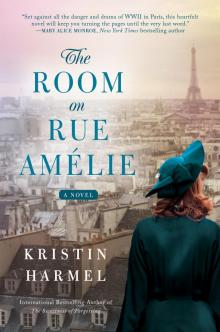 The Room on Rue Amélie
The Room on Rue Amélie The Winemaker's Wife
The Winemaker's Wife The Forest of Vanishing Stars
The Forest of Vanishing Stars The Book of Lost Names
The Book of Lost Names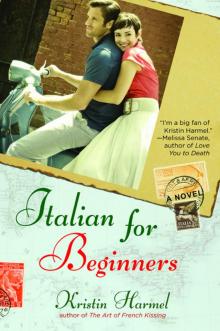 Italian for Beginners
Italian for Beginners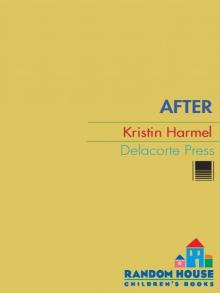 After
After How to Save a Life
How to Save a Life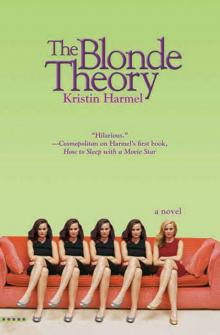 The Blonde Theory
The Blonde Theory The Sweetness of Forgetting
The Sweetness of Forgetting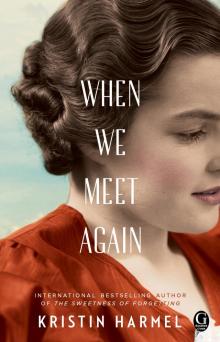 When We Meet Again
When We Meet Again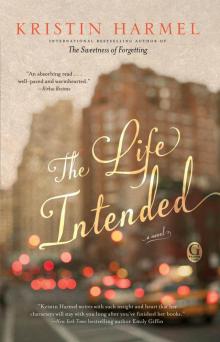 Life Intended (9781476754178)
Life Intended (9781476754178)